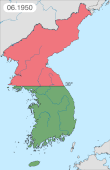Who are the Most Beloved People? (Chinese: 谁是最可爱的人; pinyin: Shéi Shì Zuì Kě'ài De Rén) is the title of a famous essay about the People's Volunteer Army (PVA) in Korea written by Chinese journalist Wei Wei.
Content
The essay revolves around the theme that the Chinese soldiers are the "most beloved people". To illustrate this point, Wei Wei lists three examples of the soldiers' sacrifices. The first example describes the battle between the Chinese 38th Corps and the US 2nd Infantry Division at the Battle of the Ch'ongch'on River and how a company of soldiers sacrificed themselves during combat. The second example shows an artilleryman rescued a child in the aftermath of an air strike and volunteers for rifleman duty in order to avenge the aggressions against the Korean people. The third example records a conversation from a soldier and his selfless commitment towards the liberation of Korea. The essay ends with a reminder that the peace at home is not possible without the sacrifices from the "most beloved people".
Impacts
Described as smooth reading and moving, the essay became instantly popular in China after it was published on April 11, 1951, in the People's Daily newspaper. The essay had also earned praises from the top Chinese leaders. Considered the most famous literary and propaganda piece produced by China during the Korean War, the essay succeed in elevating the soldiers' traditionally low social status within the Confucian culture, and helped to boost the recruitment of soldiers for the Korean War. In the decades following the essay's publication, the phrase "most beloved people" has become synonymous with the PVA and PLA in mainland China, while the essay has become required reading in Chinese school curriculum.
References
Citations
- ^ Zhang 2002, p. 158.
- Chinese Military Science Academy 2000, pp. 107–108.
- ^ Mahoney 2001, p. 30.
- Wei 1951.
- Chinese Military Science Academy 2000, p. 107.
- ^ West, Levine & Hiltz 1998, p. 195.
Sources
- Chinese Military Science Academy (2000), 抗美援朝战争史 [History of War to Resist America and Aid Korea] (in Chinese), vol. II, Beijing: Chinese Military Science Academy Publishing House, ISBN 7-80137-390-1
- Mahoney, Kevin (2001), Formidable Enemies : The North Korean and Chinese Soldier in the Korean War, Novato, CA: Presidio Press, ISBN 978-0-89141-738-5
- Wei, Wei (魏巍) (1951), "谁是最可爱的人" [Who are the Most Beloved People?], People's Daily (in Chinese), Beijing, archived from the original on 2016-03-03, retrieved 2009-11-20
- West, Philip; Levine, Steven I.; Hiltz, Jackie (1998), America's Wars in Asia: A Cultural Approach to History and Memory, Armonk, NY: M.E. Sharpe, ISBN 0-7656-0237-7
- Zhang, Hong (2002), The Making of Urban Chinese Images of the United States, 1945-1953, Westport, CT: Greenwood Press, ISBN 0-313-31001-7
